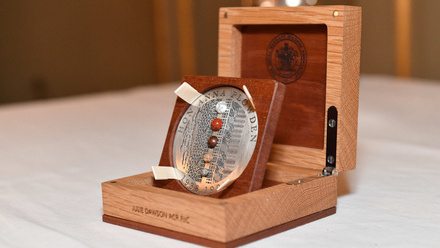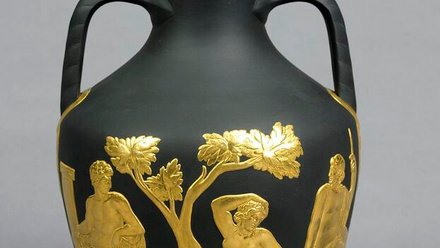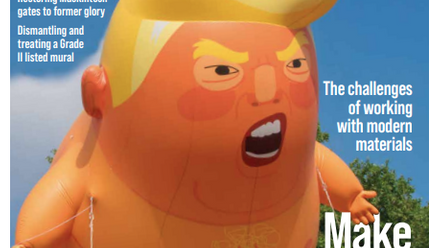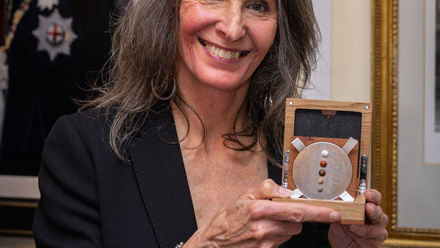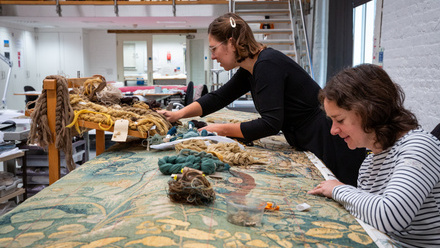What made you realise that you wanted to be a conservator?
Professor of Conservation and Icon member Jane Henderson ACR has been awarded the Plowden Medal for Conservation in recognition of her contribution to the field of conservation.
Established in 1999 to commemorate the life and work of the late Hon. Anna Plowden CBE (1938 – 1997), the gold medal was endowed by the Royal Warrant Holders Association, of which she was Vice-President. In her video interview below, Jane introduces Anna Plowden and the Anna Plowden Trust.
The 2021 medal was awarded to two individuals for the first time: Professor Jane Henderson ACR and director of Holy Well Glass Stephen Clare ACR MBE in light of the year’s impressive entries.
The two links mentioned in Jane's interview are the Anna Plowden Trust website (annaplowdentrust.org.uk) and the brief introduction of the Trust on YouTube.
1. What made you realise that you wanted to be a conservator?
I was very young when I first realised I wanted to be a conservator. In primary school and I watched a television programme about scientists unwrapping a mummy, and thought ‘that is what I want to do’. I tried telling this to my careers guidance counsellors but it took me until the latter part of secondary school before someone explained that what I wanted to study was called conservation.
2. What were the key stages in your conservation training?
I took an undergraduate BSc in conservation straight from school. Having been lucky enough to be educated in Scotland I was allowed to take an eclectic mix of topics. My 6th year studies (final school qualifications in Scotland) topics were an archaeologically focused study on ‘Romans and natives in north Britain’, chemistry where I undertook a chromatography project which I thought would help me with conservation and English where I studied Sylvia Plath just for fun. My chromatography project was a step back for my earlier plans to undertake amino acid racemisation but I was disappointed to discover this wasn't possible to do in my bathroom. The success of my undergraduate degree was mixed, I started out a hardworking and diligent student but arriving in Wales during the miners’ strike followed immediately by the introduction of fees for students provided me with sufficient distraction that I think it's fair to say I didn't put all my focus on my studies. I then went to work in museums and had the familiar short term contract experience for many years. After acting as a museum adviser and struggling with my ability to influence outcomes across many museums I returned to university to take a masters in collections care where I focused on influence techniques for my research. Attending the IIC preventive conservation conference in Ottawa was a decisive moment for me, where everything just seemed to click into place, I came back from that conference with a much clearer idea I've had to be a conservator.
3. You now teach on the BSc and MSc degrees in Conservation and Collection Care at Cardiff University. What do you hope to achieve in your current job role?
In teaching just getting through another year has to be one aspiration! My current aspirations focus around achieving those moments where you really connect with a student around an idea, or project or you help them springboard into an activity that's the perfect fit for them. This summer I was pleased to be able to place some students in placements where I felt that was all they needed to take themselves forward into the next exciting part of their careers. Although teaching is quite exhausting it must be one of the most rewarding careers possible, I feel proud about the achievements of all of our alumni and I just want them to go out there and enjoy conservation.
4. You’re also an Icon Accredited conservator. Why does Accreditation matter?
Accreditation matters a huge amount to me. I was involved from the very beginning in drawing up the scheme and it was definitely a response to those frequently expressed concerns that our skills and expertise are not sufficiently valued. It is incredibly important to help people understand where to find well qualified, thoughtful conservators. I hope that it is not an exclusive process: we worked hard to find the universal of a professional conservator and to create pathways that celebrate achievements rather than act as gatekeepers. We are the experts and we can't expect everyone who has an object that they value to understand how to find the best person to conserve it. I think it is up to us to help them find a conservator who will support them to make the very best use of their art or object or document.
5. Winning the Plowden Medal is a wonderful achievement. Aside from this what has been your greatest success so far?
I find this hard to answer, professionally I have favourite objects that I've worked on (a mediaeval wooden painted figure of Mary). I am proud of my family - anyone who sat through a slideshow of mine will tell you. Becoming professor was pretty amazing as was being elected Secretary General of IIC. I'm proud of my papers, my paper on uncertainty grew from reading leaflets that I was given as a cancer patient, my Beyond Lifetime's paper in the Icon Journal allowed me to bring together my personal social vision with my professional approach. Some of the work I have done internationally makes me proud for my part in training conservators transform a museum store with precious few resources. I have been lucky enough to see several of my students win Icon awards for their brilliant work - I think I take the most professional pride in the achievements and happiness of those I've helped to teach.
6. What are your hopes for the future of the conservation profession?
Conservation is a powerful route for women into STEM careers, I'd like to encourage all conservators to fulfil their ambitions but also to be able to move up in organisations and take leadership roles, making decisions about the future of many aspects of cultural heritage management. I think that conservators should be on an equal footing with other professionals in our sector but I think we still have some work to do to get there. Part of this has to be an outcome of us integrating into wider sectoral goals.
7. Any last words of advice for aspiring conservators?
Speak your value. You won't always be valued to the extent that you should be but if you articulate what you're worth you just might find it works.
We thank Professor Jane Henderson ACR for participating in this interview.

